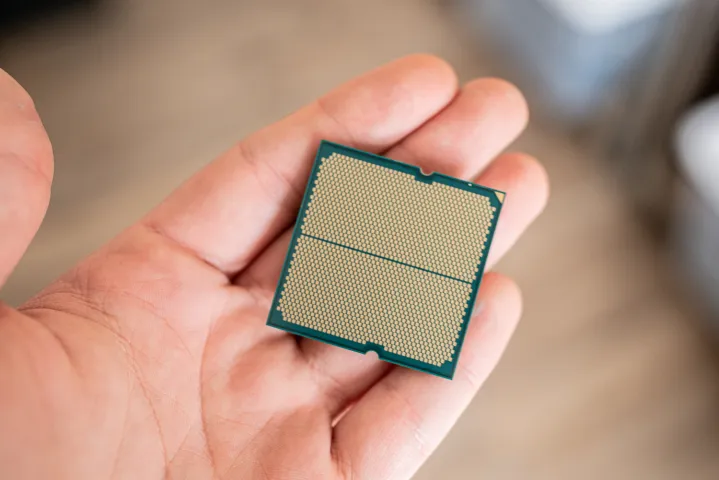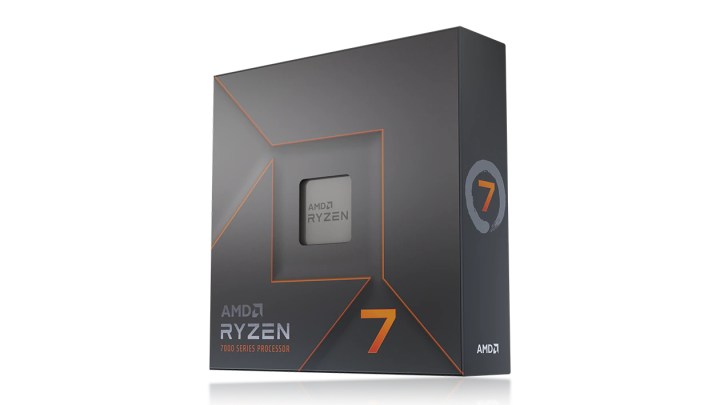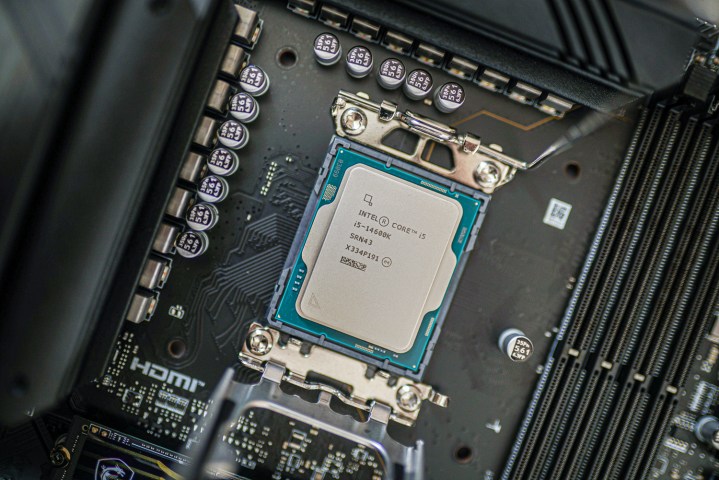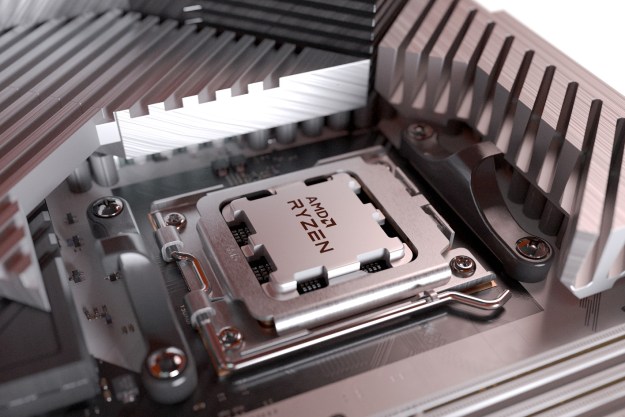
If you want a midrange processor in 2024, two of the best options available are AMD’s Ryzen 7 7700X and Intel’s Core i5-14600K. These $300-ish processors offer lots of cores for high performance computing and gaming, as well as 5GHz+ clock speeds. They aren’t quite as powerful as the very top chips, but they are still blazingly fast, and have more modest power demands than their higher-end siblings.
But which is the best? If you’re looking to buy or build a new PC in 2024, one of these chips might be the best CPU for you. Here’s how they stack up.
Pricing and availability
The AMD Ryzen 7 7700X debuted in September 2022 with a launch price of $400. It’s since come down in price significantly, and although list prices today are around $350, it’s typically available at a discounted price of around $290.

The Core i5-14600K is newer, only making its debut in October 2023. Its launch price was $320, and though it too is typically listed around $350, it is priced at $300 at most retailers at the time of writing.
Both processors are widely available from a range of retailers.
Specs
| AMD Ryzen 7 7700X | Intel Core i5-14600K | |
| Cores/threads | 8/16 | 6P+8E/20 |
| Base clock | 4.2GHz | 3.5GHz |
| Boost clock | 5.0GHz | 5.3GHz |
| L2+L3 cache | 40MB | 44MB |
| TDP | 105W | 125W/181W |
| Price | $290 | $300 |
The main difference between AMD and Intel’s latest generations of CPUs is their core design. Where AMD’s Ryzen 7 7700X has eight standard Zen 4 cores, with support for 16 threads thanks to simultaneous multithreading, the Core i5-14600K has six performance cores and eight efficiency cores. Only the performance cores support hyperthreading, though, so the overall thread support is 20.
The 14600K has a slightly higher boost clock, and a touch more cache, though it does demand a lot more power in exchange.
Performance
Both of these processors are well-tested by a range of publications, so we have a lot of data to draw on in making our performance comparisons.
In gaming, TechPowerUp has the 7700X and 14600K within just a couple of percent each other across a broad range of titles — though the 14600K is the slightly faster processor. PCMag found similar results in real-world games, though the 14600K was well ahead in 3DMark testing. Meanwhile PCGamer had the 14600K trading blows with the weaker Ryzen 7 7700 (non-X), suggesting the X version might have taken the top spot if it were tested in the same configuration.

Both processors are well-suited to playing games at 1080p, 1440p, or 4K, though their high-end performance will be most felt at lower resolutions if paired with a powerful graphics card.
In productivity tests, however, the Core i5-14600K was far more dominant. According to PCGamer, it outperformed the 7700X in video editing by almost 50%, and it transcoded a 4K video in three-quarters of the time i took the 7700X. PCMag concluded the same, highlighting just how much the extra efficiency cores on the 14600K improve its performance in apps that can take full advantage of them.
Those extra cores do use a lot of power, though, despite their “Efficiency” branding. The 14600K will pull its full 180-watt thermal design power (TDP) if you give it a demanding enough workload. When using only its performance cores in games, though, the 14600K is much more efficient, pulling less than 100W at all times, according to TechPowerUp, and typically less than 80W in less-demanding games. The 7700X is still more efficient, pulling 10% to 20% less power during almost every task.
That makes it easier to cool and cheaper to run, but not by a dramatic amount.
Upgrade potential
The AMD Ryzen 7 7700X is a ground-floor CPU for the AM5 socket. It’s part of the first generation of processors to support it and AMD has pledged multigenerational support with AM5, as it did with AM4. That means that today you can upgrade the 7700X to great gaming CPUs like the 7800X3D or greater core count production powerhouses like the 7950X. But also in the future, when the next-generation of CPUs are released, you’ll be able to upgrade to one of those without replacing your motherboard. You may even be able to do it with the generation beyond that, and once again, if AMD mimics its AM4 upgrade system.
The 14600K, on the other hand, is limited to its own generation. While you can upgrade it to the 14700K or 14900K if you want more cores, the gaming performance difference is very minor, and the power draw goes up significantly. Since Intel is shifting to a new socket with its next-generation Arrow Lake CPUs, you’ll need to upgrade your motherboard to go much beyond the 14600K.
7700X vs 14600K: What’s the best CPU?
If you want the fastest of these two CPUs today, with no other considerations in mind, the 14600K is the better CPU. It is slightly faster in gaming, significantly faster in productivity tasks that can utilize more cores, and it has great overclocking potential.
However, that’s not the whole story. The 14600K does use a lot more power than the 7700X, so if you’re building a small form factor system, it’s well worth considering the 7700X instead for its easier cooling and lower overall power needs. The AMD CPU also has a much brighter future if you think you’ll upgrade it within the next couple of years. Also, if you’re predominantly a gamer, you aren’t going to notice much of a difference between these two processors, if any — especially if you play at 1440P or 4K.
So, which is best, for you? If you want the highest-performing CPU right now, then the 14600K is the best tool for the job. You can even pair it with a cheaper motherboard and DDR4 memory to save some more money if you want — although that will mean sacrificing overclocking. But if you want a CPU that is almost as good, and will be easier to upgrade in the future, the 7700X is a great buy too.
Want even more power? The 7800X3D is the best gaming CPU in the world, and it’s only about $50 more than either of these. The 14600K would still beat it in most productivity tasks, though.
Editors' Recommendations
- What is CPU cache, and why is it so important for gaming?
- I compared all of AMD’s V-cache CPUs to see which you should buy
- What’s the best $100 CPU? I compared the two main options
- What is CPU usage, and how to fix high CPU usage
- I tested Intel’s Core i5-14600K against its cheaper sibling. Don’t waste your money





